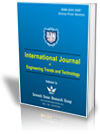Inadequate and Poor Electricity Metering Affect Energy Efficiency End-user Behaviour in Nigeria
Citation
Divine N. Utazi , Nnaemeka S. P. Obuka. "Inadequate and Poor Electricity Metering Affect Energy Efficiency End-user Behaviour in Nigeria ", International Journal of Engineering Trends and Technology (IJETT), V12(8),371-377 June 2014. ISSN:2231-5381. www.ijettjournal.org. published by seventh sense research group
Abstract
Electricity metering has been identified as one of technologies where end-use energy efficiency can particularly be encouraged in households through its impact on tenants’ behaviour. Inadequate metering is one of the immediate obstacles facing Nigeria power industry. In other to further increase energy efficiency capacity considering the economic and environmental benefits, this review takes a look at the electricity metering situation and how it affect energy efficient end-user behaviour in Nigeria. Energy efficient end-user behaviour is a critical parameter to the success of each national energy policy and programs. Metering gives consumers’ clear and comprehensive information about their energy consumption and, with providing better information, can help consumers to become more energy efficient. In other to encourage efficient use of electricity in Nigeria, the Distribution Companies (DISCOs) should adopt a firm policy for 100% metering.
References
[1] Energy Efficiency Survey in Nigeria 2009, Community Research and Development Centre.
[2] B. Lebot, "Energy Efficiency and Market Transformation: A Short Overview of Best Practices." A paper presented during the Inception Workshop of the UNDP-GEF Project to Promote Energy Efficiency in Residential and Public Building in Nigeria, 2009.
[3] European Commission, Communication from the Commission to the European Parliament, the Council, the European Economic and Social Committee and the Committee of the Regions: and: Energy Efficiency Plan 2011, Brussels, 2011
[4] European Commission, Smart Grids: from innovation to deployment, COM (2011) 202 final, Brussels, April 2011
[5] KEMA (Keuring van Elektrotechnische Materialen te Arnhem). Www.dnvkema.com
[6] ESMA(European Smart Metering Alliance), Annual Report on the Progress in Smart Metering, January 2010
[7] NEPA ACT cap 256, Laws of the Federation of Nigeria, 1990
[8] Nigeria Electric Power Sector Reform Act, No. 6 of 2005
[9] Metering Enquiry Committee 2012, National Electricity Regulatory Commission (NERC).
[10] Africa Energy Yearbook 2013
[11] F. N. Obafemi, E. O. Ifere, "Non-Technical Losses, Energy Efficiency and Conservative Methodology in the Electricity Sector of Nigeria: The Case of Calabar, Cross River State" International Journal of Energy Economics and Policy Vol. 3, No. 2, pp.185-192, 2013.
[12] Supra, n. 10 at p.2.
[13] S. Allal, Energy Efficiency Challenges in Southern and Eastern Mediterranean Countries, an Imperious Need for Sustainable Development: Challenges and Constraints. www.helio -international.org/Helio/anglais/reports/Mediterranean.html
[14] Supra, N 18 at p. 181.
References
Electricity, Metering, Energy Efficiency, End-users Behaviour, DISCOs, Nigeria




 10.14445/22315381/IJETT-V12P272
10.14445/22315381/IJETT-V12P272